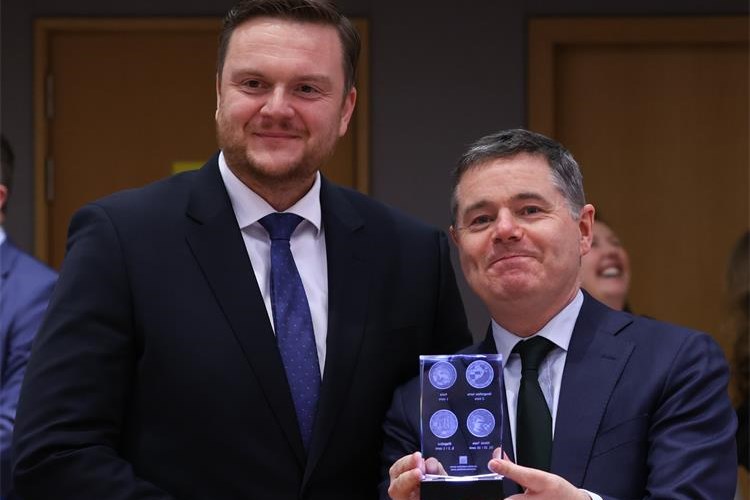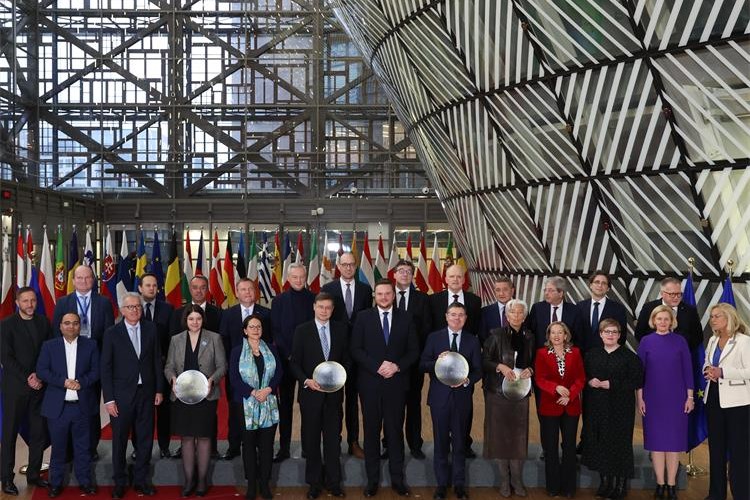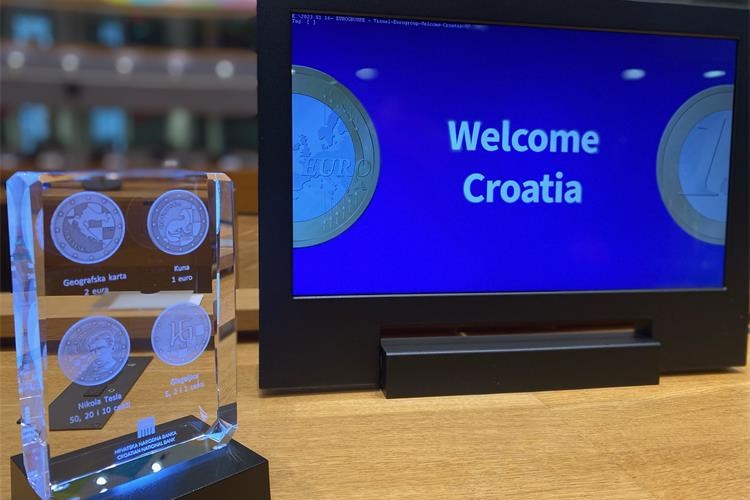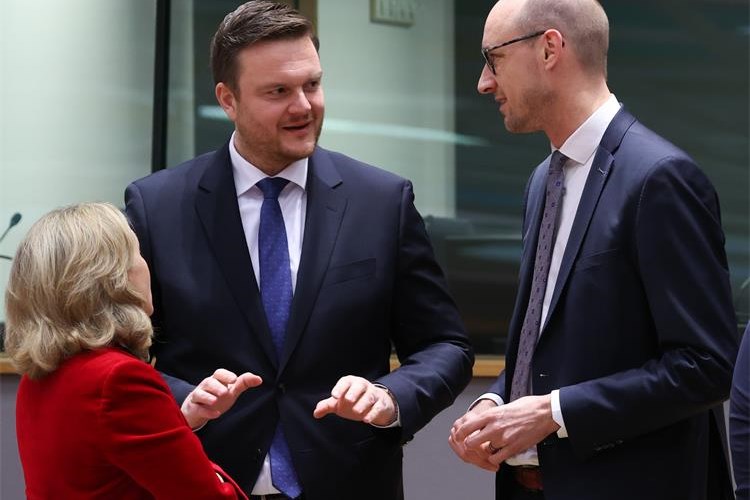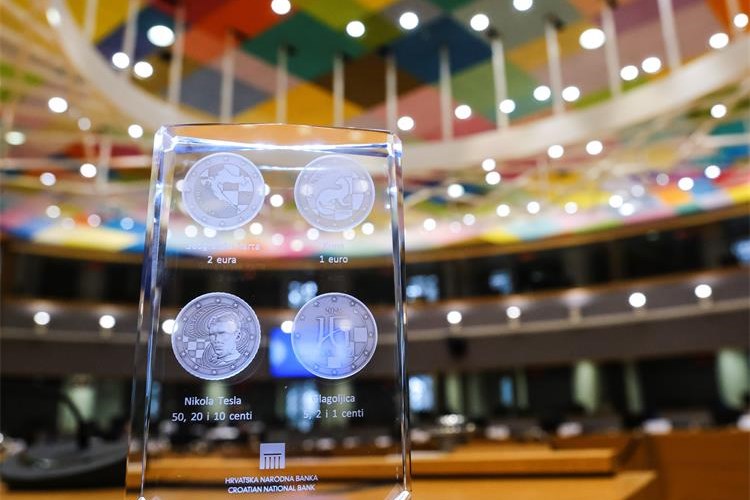- Published: 01.01.2023.
Croatia becomes twentieth member of the euro area
The authors are Paschal Donohoe, President of the Eurogroup and Minister for Public Expenditure, National Development Plan Delivery, and Reform of Ireland and Marko Primorac, Minister of Finance of the Republic of Croatia
On 1 January, Croatia began a new chapter in its history – by becoming the 20th EU country to introduce the euro.
It is a momentous day for the people of Croatia as it is for all of us in Europe.
By becoming its twentieth member in a little more than 20 years of the euro’s existence, Croatia’s accession is a timely reminder of the core values that unite us, the common cause that guides us and the shared objectives that make us a broader and stronger union. Amid ever-greater uncertainty, an unstable geopolitical environment and challenging economic prospects clouded by the unjustified and cruel war raging at our borders, Croatia's achievement offers us respite and, above all, hope.
Croatia joins the euro area as well as the Schengen area just a decade after becoming a member of the European Union and barely three decades after becoming an independent country. Croatia has come a long way at record speed. It is now among the fastest growing economies in Europe – well above the EU average – and among those with stronger growth forecasts for this year.
Euro membership will bring many tangible benefits for Croatian citizens and businesses alike. The euro makes it easier and safer for citizens to travel, work or study across the euro area. It is particularly good news for Croatia's booming tourism sector, which accounts for around a fifth of the country's GDP. Being part of the euro area will make investment in Croatia easier and more attractive, as it will eliminate currency exchange costs and associated risks and thus lower barriers for businesses. It will also ensure lower interest rates and overall greater financial stability. In the long run, the common currency will contribute to the economy's resilience and a higher standard of living.
Croatia has worked hard to achieve the economic convergence required for the introduction of the euro. The country has implemented far reaching economic and governance reforms, curbed inflation, and pursued sound public spending policies. Croatia's banking sector has also taken steps to allow the country to join the banking union.
Despite the challenges caused by the COVID-19 pandemic and devastating earthquakes, Croatia’s efforts and determination have paid off. In the summer of 2022, the EU institutions and finance ministers concluded that Croatia's economy was ready to introduce the euro.
As a member of the euro area, Croatia will also join the European Stability Mechanism, and from now on will take a seat in the Governing Council of the European Central Bank. We look forward to working together at the monthly meetings of the Eurogroup, which brings together finance ministers from the euro area to discuss matters relating to our common currency.
Croatia is joining the euro area at a difficult time. Although current geopolitical developments, high energy prices and inflation are affecting our economies differently, we all face a high degree of uncertainty and similar challenges. Our economies are forecast to slowdown in the coming months.
Yet we should be optimistic. Economic growth in the euro area in the first half of last year [2022] was higher than expected, and labour markets have shown remarkable resilience. We also have the €750 billion recovery plan that helps governments finance growth-enhancing reforms and investments. In addition, through close coordination of our economic and fiscal policies, we can help overcome the difficulties we face today.
Economic policy coordination will be one of the most important discussions in the coming months in the Eurogroup, but there are other projects and tasks ahead for the euro area finance ministers this year. To name just a few, we will be looking into strengthening the foundations of the economic and monetary union, through the review of our common budgetary rules and further work on the banking union. And work on an ECB-backed digital euro is underway to ensure our currency is responsive to future needs.
We must also look to the future and avail of the opportunities that the new geopolitical realities are creating. As the war is drastically accelerating our energy transition, we need to combine our efforts and resources to ensure that the EU becomes the global leader in renewable energy, and the euro, the currency of a low carbon future.
The euro is proof of what we can achieve when we work together. By sharing a common currency, we inevitably share our goals and align our policies. The advantages of European integration go beyond economic benefits: our strength lies in our unity of purpose, our commitment to a shared European destiny, our inseparable ties. The famous inventor, Nikola Tesla, whose image adorns some of the Croatia-minted euro coins, provides a particularly fitting while poetic description of the links that tie European people together: “Though free to think and act, we are held together, like the stars in the firmament, with ties inseparable. These ties cannot be seen, but we can feel them.”
No matter the challenges that lie ahead, Europe will find common solutions. And Croatia, more than ever, will be part of them.
News
On 1 January, Croatia began a new chapter in its history – by becoming the 20th EU country to introduce the euro.
It is a momentous day for the people of Croatia as it is for all of us in Europe.
By becoming its twentieth member in a little more than 20 years of the euro’s existence, Croatia’s accession is a timely reminder of the core values that unite us, the common cause that guides us and the shared objectives that make us a broader and stronger union. Amid ever-greater uncertainty, an unstable geopolitical environment and challenging economic prospects clouded by the unjustified and cruel war raging at our borders, Croatia's achievement offers us respite and, above all, hope.
Croatia joins the euro area as well as the Schengen area just a decade after becoming a member of the European Union and barely three decades after becoming an independent country. Croatia has come a long way at record speed. It is now among the fastest growing economies in Europe – well above the EU average – and among those with stronger growth forecasts for this year.
Euro membership will bring many tangible benefits for Croatian citizens and businesses alike. The euro makes it easier and safer for citizens to travel, work or study across the euro area. It is particularly good news for Croatia's booming tourism sector, which accounts for around a fifth of the country's GDP. Being part of the euro area will make investment in Croatia easier and more attractive, as it will eliminate currency exchange costs and associated risks and thus lower barriers for businesses. It will also ensure lower interest rates and overall greater financial stability. In the long run, the common currency will contribute to the economy's resilience and a higher standard of living.
Croatia has worked hard to achieve the economic convergence required for the introduction of the euro. The country has implemented far reaching economic and governance reforms, curbed inflation, and pursued sound public spending policies. Croatia's banking sector has also taken steps to allow the country to join the banking union.
Despite the challenges caused by the COVID-19 pandemic and devastating earthquakes, Croatia’s efforts and determination have paid off. In the summer of 2022, the EU institutions and finance ministers concluded that Croatia's economy was ready to introduce the euro.
As a member of the euro area, Croatia will also join the European Stability Mechanism, and from now on will take a seat in the Governing Council of the European Central Bank. We look forward to working together at the monthly meetings of the Eurogroup, which brings together finance ministers from the euro area to discuss matters relating to our common currency.
Croatia is joining the euro area at a difficult time. Although current geopolitical developments, high energy prices and inflation are affecting our economies differently, we all face a high degree of uncertainty and similar challenges. Our economies are forecast to slowdown in the coming months.
Yet we should be optimistic. Economic growth in the euro area in the first half of last year [2022] was higher than expected, and labour markets have shown remarkable resilience. We also have the €750 billion recovery plan that helps governments finance growth-enhancing reforms and investments. In addition, through close coordination of our economic and fiscal policies, we can help overcome the difficulties we face today.
Economic policy coordination will be one of the most important discussions in the coming months in the Eurogroup, but there are other projects and tasks ahead for the euro area finance ministers this year. To name just a few, we will be looking into strengthening the foundations of the economic and monetary union, through the review of our common budgetary rules and further work on the banking union. And work on an ECB-backed digital euro is underway to ensure our currency is responsive to future needs.
We must also look to the future and avail of the opportunities that the new geopolitical realities are creating. As the war is drastically accelerating our energy transition, we need to combine our efforts and resources to ensure that the EU becomes the global leader in renewable energy, and the euro, the currency of a low carbon future.
The euro is proof of what we can achieve when we work together. By sharing a common currency, we inevitably share our goals and align our policies. The advantages of European integration go beyond economic benefits: our strength lies in our unity of purpose, our commitment to a shared European destiny, our inseparable ties. The famous inventor, Nikola Tesla, whose image adorns some of the Croatia-minted euro coins, provides a particularly fitting while poetic description of the links that tie European people together: “Though free to think and act, we are held together, like the stars in the firmament, with ties inseparable. These ties cannot be seen, but we can feel them.”
No matter the challenges that lie ahead, Europe will find common solutions. And Croatia, more than ever, will be part of them.


